Your thyroid may be the most important endocrine gland in your body.
It regulates the things that everyone cares about like weight, hair growth, mood, and even other hormones.
It also just so happens to be incredibly sensitive and easy to damage.
And millions of people are walking around damaging their thyroid every day without even realizing it.
But that’s not going to happen to you because today we’re talking about habits that damage your thyroid so you can avoid them.
Let’s jump in:
#1. Not Sleeping Enough
What you need to understand is that SLEEP plays a very important role in regulating not only your thyroid but also OTHER hormones and, perhaps most importantly, inflammatory pathways.
And if you don’t get enough sleep, several things happen that are less than ideal:
The first is that you will see a drop in thyroid function.
We know that people sleeping fewer than 6 hours per night have lower than normal free T3 and free T4 levels (1).
This translates into a slower than normal metabolism which means you’re more likely to gain weight.
It doesn’t stop there either… you’ll also end up with higher levels of inflammation and changes to your stress hormones (2).
Both of these further reduce thyroid hormone levels leading to fatigue.
All of these negative effects occur at around 6 hours of sleep per night.
Practically speaking, that’s about 28.3% of Americans or 1 in 4 (3).
The solution is simple:
Sleep at least 7 hours each night but get as close to 8 as you possibly can.
Doing so means you’ll have better thyroid function, more energy, an easier time managing your weight, and more balanced hormones.
#2. Ignoring Nutrient Deficiencies
In a perfect world, you’d be getting all of the micronutrients, vitamins, and minerals that your body needs from your diet.
But we don’t live in a perfect world and very few people eat the nutrient-dense foods, like liver and organ meats, required to hit these numbers.
What does this mean?
It means that many people are walking around with sub-optimal nutrient levels which can and do impact thyroid function.
When you couple dietary problems with factors like stress, which accelerate the elimination and usage of vitamins, it’s easy to see why many people should be taking a few extra supplements here and there.
Even doctors who are fairly anti-supplement still recognize the need for multivitamins.

The reality is that you can take a basic multivitamin that contains all of the major ingredients that your thyroid needs to function and call it a day.
Keeping your nutrient status optimized can go a long way to prevent thyroid problems from even popping up in the first place.
And many people report experiencing more energy and just feeling overall more like themself when taking a multivitamin.
Your thyroid requires many different nutrients to function at 100% but some are more improtant than others.
Here are the ones you want to pay the most attention to:
- Zinc – Zinc helps your body activate thyroid hormone. Zinc deficiency increases the older you get (4).
- Selenium – Selenium helps your body protect your own thyroid gland from inflammation and damage. Low selenium levels increase your risk of developing Hashimoto’s.
- Iodine – This is needed to create thyroid hormone. If you don’t have enough, you will experience problems. Many people aren’t getting enough iodine because it comes primarily from seafood.
- Magnesium – Magnesium helps your body use thyroid hormone and keeps stress hormones balanced. It also happens to become depleted in times of stress.
- Vitamin A – Vitamin A helps thyroid hormone work inside of your cells. According to research, up to 50% of Americans aren’t getting enough vitamin A from their diet.
- Vitamin D3 – Vitamin D protects your thyroid gland from cancer and it also helps prevent autoimmune disease. According to research, about 1 in 4 Americans don’t have enough vitamin D.
Sure, you can definitely spend the time to try and get all of these vitamins from your diet, but you can also just take a multi and call it a day.
I’ll let you decide which option is best for your situation, but no matter what you do, just don’t ignore them.
#3. Not Eating Enough Food
And I should also say that not eating enough carbohydrates can also cause problems for your thyroid.
But let’s talk about calories first:
We live in a time where obesity is truly an epidemic.
And everyone knows that in order to lose weight, you must cut calories, right?
I won’t deny that cutting calories is certainly part of the solution to weight loss, but there’s more to it than just that.
Because excessive calorie restriction has been shown to have a negative impact on your thyroid (5).
And this promotes a problem for patients who are trying to lose weight.
How do you expect to lose weight and keep it off if you are damaging the very hormone that is responsible for managing your metabolism?
You’re going to have a hard time because as you cut your calories, you will see a decline in how many calories you burn at rest.
Eventually, if you do it too long, you’ll run yourself into a situation where you’ll be eating 1,200 calories a day just to maintain your weight.
This is not sustainable long-term.
The solution?
Avoid excessive calorie restriction.
Your body and thyroid have a much better time adapting to 100 or 200 calories cut from your diet versus 500 or 1,000.
Sure, you will see faster weight loss with the more extreme cut, but it comes at a cost, and your results will be short lived.
This is a huge part of the reason that research shows 95% of people who try to lose weight end up failing or regaining all of their weight back.
If you extend out your time horizon, avoid excessive calorie restriction, and eat real whole foods, you can support your thyroid and lose weight in the process.
But if you are trying to rush to your target goal, you will be doing your body and thyroid no favors whatsoever.
By the way, just like calories, carbohydrates are also important for maintaining thyroid function.
This is why research shows that patients on very low carb diets see changes T3 if they stay on that diet for a long period of time.
You can usually get by with low carb diets for 3-6 months, but staying low carb for longer than that may increase your risk of problems.
#4. Not Eating Enough Protein
On the topic of food, I should probably also mention that protein happens to be a form of super fuel for your thyroid.
But probably not in the way you’re thinking.
Yes, eating protein happens to be important for helping your body create thyroid hromone by providing the amino acid tyrosine.
But the majority of the impact you’ll feel with more protein intake comes from muscle mass.
As a percentage of your total body weight, muscle mass accounts for about 30-40%.
And this muscle mass happens to be a huge site of thyroid hormone action.
Remember:
Thyroid hormone helps to activate the tissues that it comes into contact with.
So what do you think happens when thyroid hormone interacts with your mucles?
It promotes muscle growth and repair, it increases muscle metabolism, and it improves muscle tone (6).
This translates into a huge amount of calories burned at rest and it also provides you with a lot of subjective energy and momentum.
But this only occurs if you have a healthy amount of muscle mass for your age.
And this is where your protein intake comes into play.
It’s estimated that 1 in 3 Americans are not consuming enough protein which means their muscle mass may be suffering.
By extension, this means that they are not only losing out on a lot of free calories to burn, but also the stimulation of thyroid hormone that comes along with it.
It’s in this way that your muscle mass and thyroid function are intertwined.
And you can easily optimize both by simply eating enough protein.
There are lots of different formulas to get to your ideal protein intake but my personal recommendation is to aim for 100 grams per day.
You may want more if you are trying to actively build muscle, but this is plenty to simply support your thyroid.
#5. Eating Too Much Sugar & Processed Foods
If you want to destroy your thyroid in a hurry then eat a diet high in refined sugar and processed foods.
The reason?
Because they cause liver damage.
Your liver is the location in your body where the most powerful thyroid hormone is created known as T3
And if it’s impaired, for any reason, your body’s ability to create this hormone, will slow down.
When it comes to ensuring your liver is healthy, you need only look at your diet.
The most common causes of liver damage, known as fatty liver, stem from the consumption of excess sugar, alcohol, and ultra-processed foods.
If you eat a lot of these foods, your thyroid will be impaired. It’s that simple.
And this impairment can be quite significant because up to 60% of T3 conversion occurs here.
You can tell if your diet is hurting your liver and your thyroid by checking your liver enzymes.
If these enzymes are elevated, or if you’ve been diagnosed with fatty liver in the past, then there’s a good chance that it’s happening.
The good news? It’s really easy to fix.
You can reverse fatty liver in weeks to months with a few simple changes:
- Stop consuming refined sugars and processed foods.
- Make sure your diet consists of at least 90% real whole foods.
- Avoid alcohol 100%.
- Use intermittent or prolonged fasting 1 to 2 times per week.
- Use natural liver-supporting supplements like milk thistle.
#6. Ignoring Stress & Your Adrenals
If you’re a human being living in the modern world then you must pay attention to stress.
But instead of focusing solely on stress, what we really care about here is cortisol.
Cortisol is the primary stress hormone produced by your adrenal glands.
Here’s how it works:
When you get stressed your cortisol level spikes.
This spike in cortisol helps your body cope with the stress by impacting other organs in the body like your thyroid.
Constant spiking of your cortisol eventually leads to cortisol receptor resistance and changes in your serum cortisol level.
These changes then block communication from your brain to your thyroid gland, reduce T4 to T3 conversion, and increase reverse T3 levels leading to lower than normal thyroid function and all of the problems that come along with it.
The more stress you’re under, the bigger the impact.
But here’s the thing:
This is happening to your body whether you realize it or not because even everyday events trigger this response.
If you’re like most people then you probably just ignore the signs that your body is under stress and cover it up with quick fixes like sugar and caffeine.
But this only kicks the problem down the road.
You simply can’t afford to not manage your stress, it’s just not possible in the modern world.
Simple stress relieving techniques like exercise, square breathing, mindfulness, and meditation can go a long way to helping prevent this problem.
Wrapping it up
The bottom line?
If you want to live a long and healthy life free of weight gain, hair loss, and depression, then you want to make sure your thyroid is doing its job.
The best way to do that is by breaking the habits we just discussed.
By the way, if you think that these habits have impared your thyroid then you may want to consider taking some simple thyroid-boosting supplements.
You can find out which one works best in this article.
Scientific References
#1. https://www.ncbi.nlm.nih.gov/pmc/articles/PMC2910542/
#2. https://pmc.ncbi.nlm.nih.gov/articles/PMC8813037/
#3. https://news.gallup.com/poll/642704/americans-sleeping-less-stressed.aspx
#4. https://www.ncbi.nlm.nih.gov/books/NBK493231/
#5. https://pubmed.ncbi.nlm.nih.gov/1249190/
#6. https://pmc.ncbi.nlm.nih.gov/articles/PMC4037849/
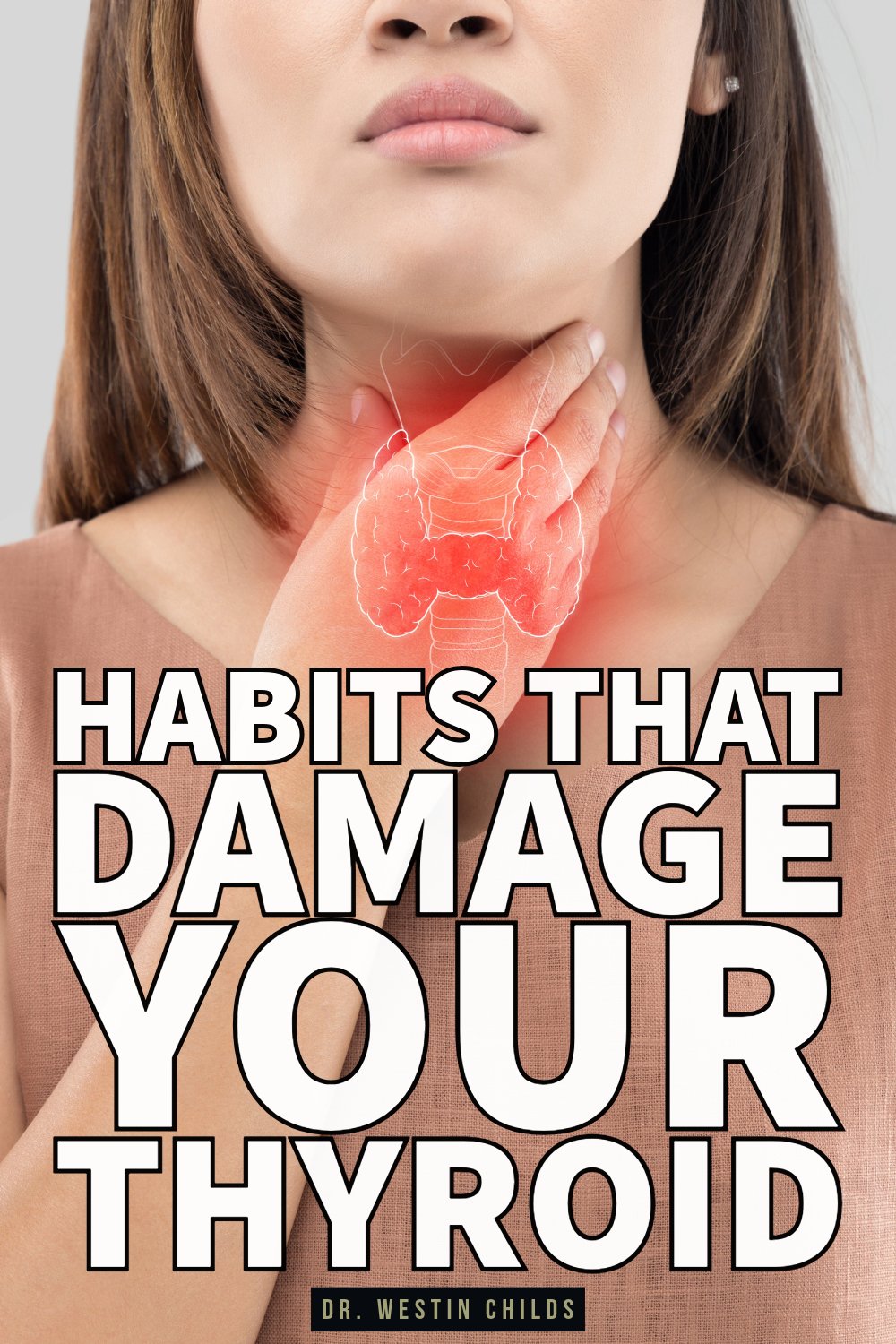
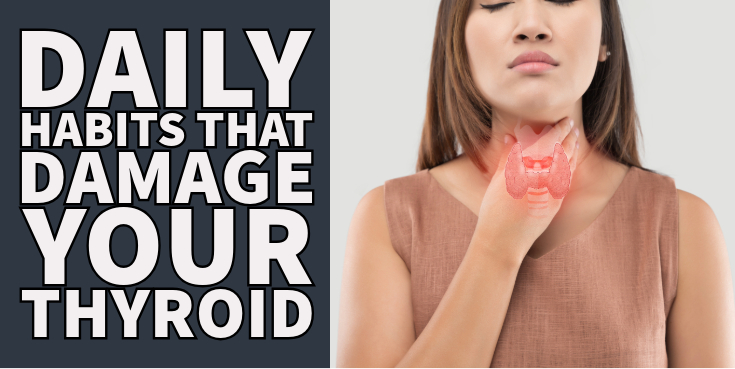

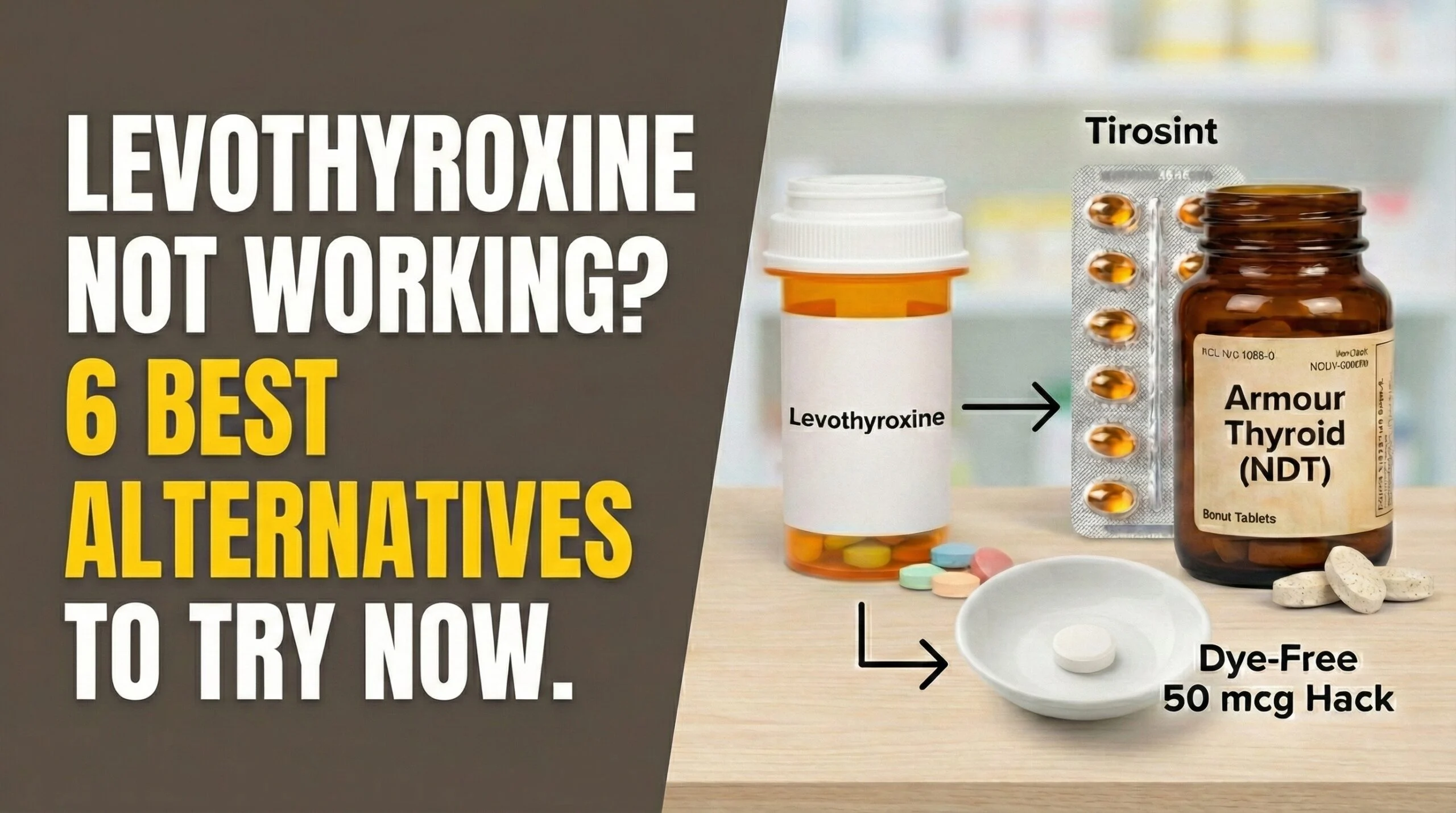
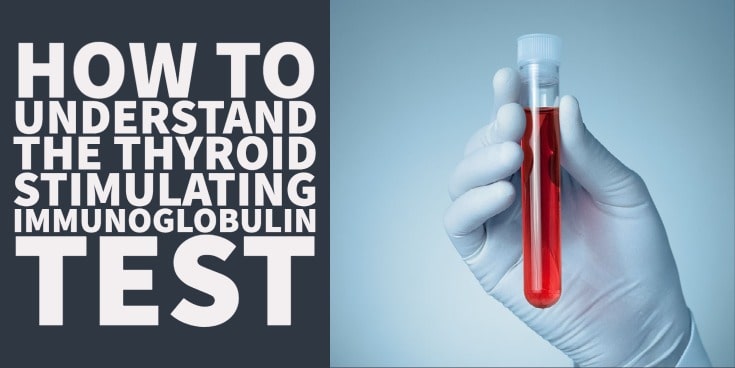
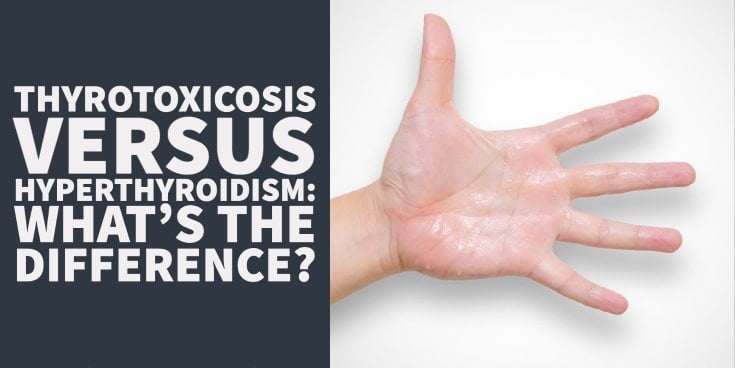

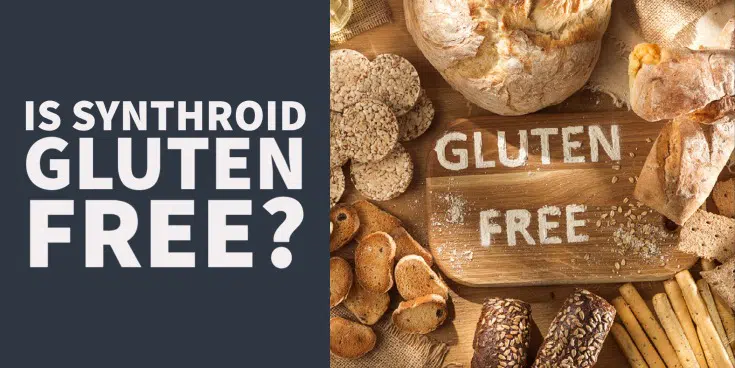
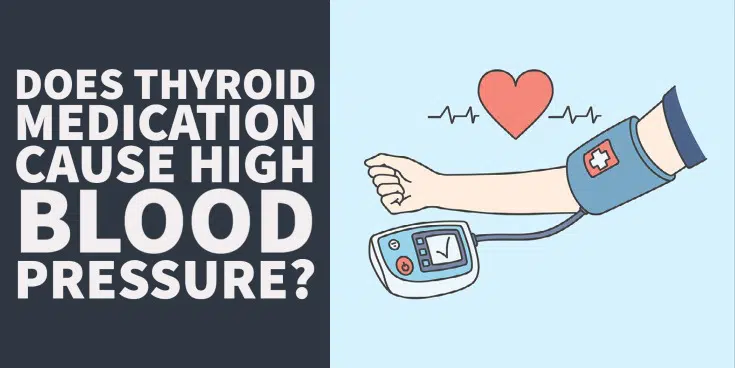

I have a question: I was on naturthroid 32.5 & my MD titrated it up to 65. I felt fantastic! Lots of energy & with a restrictive diet in sugar & simple carbs, list 20 lbs. Then in 2019 the roller coaster started. Low body temp, weight gain, tiredness. Tried Armour, no really changes. Then back on Naturethtoid. Now taking 130 mg. Of naturethtoid. Symptoms back, bloated & cant shed the 10 lbs. I now have slightly low T-SHIRT, low normal T4, & slightly high T3. MD says this is good. Wondering Why I don’t I feel better & why the weight won’t come off? My question: what are others doing in this situation?
Hi Diane,
I would recommend that you take a look at this article which explains the phenomenon you are experiencing: https://www.restartmed.com/you-cant-stay-on-the-same-thyroid-medication-dose-forever/
And this one for weight gain/weight loss resistance: https://www.restartmed.com/lose-weight-hypothyroidism/
I have had a thyroid problem for 12 years and all they want to do is take blood and put me on the same medication, I don’t feel any better numbers keep going up and they ask me why are your numbers so high , maybe five hours of sleep heaviest I’ve ever been don’t know were to turn .
Hi Tina,
I would start with the therapies on this blog. This entire website is dedicated to helping thyroid patients not only help themselves but also work with their doctor so you are in the right place 🙂
I have Hashimotos and slightly over medicated overactive thyroid from a nodule .I dont sleep well ,tops 4hrs to none.The Dr says I am not dreaming will sleeping tablets help me sleep to help my thyroid.
Hi Mary,
Be careful with prescription sleeping aids as they can cause dependence and don’t actually improve the depth or quality of your sleep.
I also have Hashimotos and have a very hard time getting to sleep. I go to bed way past midnight and am usually up early with my kids. I don’t get tired or when I am tired its allot earlier like 6pm and with kids its not possible to head to bed then. What would you recommend to take to help get to bed at a decent time but won’t cause a dependence or be harmful? Thank you!
Please I have hypothyroidism and would like someone to help me maintain it , so I can tell my endocrinologist.
Hi Dorothy,
I’m not sure I understand your question. Endocrinologists can help manage your thyroid but they tend to treat a certain way and not many thyroid patients do well on this sort of treatment.
I have plenty of info on my blog to help thyroid patients both with natural treatments and thyroid medication management.
Hi Dr. Childs;
I have Hashimotos and hypothyroid. I recently visited my dr and all my blood work was great as I was feeling pretty good ! A couple of weeks later I started feeling really tired (Woke up tired, took a nap to get through the day and really to go back to bed at 7 pm), joint pain like never before and terrible muscle pain. Yes, I was under a lot of stress but could stress cause that much trouble? It has eased up but some days it flares up. Could you give me advice on what I might could do? I’m on a low carb/no sugar diet and take supplements, and Armour .
Your doctor said that your thyroid panel looks “great.” I would be curios to know what his definition of great is. Many doctors just go by the antiquated reference chart for your thyroid levels. Not by how you feel.
I have had hypothyroid for 12 years and just recently got my TPO antibodies checked. They were over 200. I have had a dry scalp and skin for the past 6 months and can’t get rid of it. I also have been taking the same thyroid medication for the 12 years and the naturopath I saw just increased the dose. It’s synthroid 100mCL. I’ve been on 50mcg for the last 11 years. Please help. My hair is breaking off and so so dry. I don’t know if I need supplements or a different medicine. My regular doctor actually told me nothing was wrong since my TSH is “normal”.
Unless you’re willing to find a Dr to at least test your Free T3 and T4 levels you won’t find out what’s really going on. Look for an obgyn that treats thyroid, weight, and hormonal issues. I was on the same Levothyroxine for ten years but the last three years I’ve had bad hypo symptoms and the Dr always told me it was “normal.” Well, it wasn’t normal. My Free T3 levels were swiftly declining. Good Luck.
Few doctors know how to to treat Hashimoto’s. 90% of people with hypothyroid have Hashimoto’s. It’s good that your are seeing a Naturopathic doctor. Good luck.
Hi, I do not have a thyroid and I’m desperate for information on how to feel better. I’m 28, been on levothyroxine since I had my thyroid removed at 16yrs old. I have felt Like crap for so many years, I am anxious and my body is freaking out, but I’m also exhausted 24/7. Nothing I read is ever meant for people with no thyroid. Only hypothyroidism. For example, this article is saying what is good for your thyroid. I have no Idea what is good for me, what foods i should/shouldn’t eat, what supplements could help me. I have so many questions and no one to help me. Please if you have time, email me.
You just said everything I was thinking.. just waiting on some miracle blog or medicine. I’m sure you know, everyday you wake up is a crap shoot, what body function will work the least today. Will I be tired, foggy, anxiety, depression, gain 7 pounds because I ate a cracker with my low carb soup. Too hot, too cold, too forgetful, or all these things in addition to being so mentally tired, and sleep does not help!! Having no thyroid is honestly like living half a life and because we look normal, NO ONE and I mean no one understands what we go through day after freaking day and honestly i’m sick of explaining myself. If I hear one more time to “get some rest” if I’m tired, I’m going to just cry!! If you get any breath thru advise, could you do a fellow no thyroider a tip or two 🙂
Hi Stacy! You are welcome to email me at Email us: Click to view address just so we can have someone In the same situation to stay in touch with in case we find ways to feel better. The articles he sent me below are already seeming helpful.
Hi Tiffany,
I have a number of articles and resources designed just for people like you. I would take some time looking through my articles and website because it will provide you with more information than you could possibly want. Here are a few examples:
https://www.restartmed.com/thyroidectomy-supplements/
https://www.restartmed.com/should-thyroidectomy-rai-patients-take-thyroid-supplements/
https://www.restartmed.com/weight-loss-after-thyroid-removal/
Wow great thank you! I have already been taking zinc since COVID started so I will continue to take that and I’ll add selenium for sure. The articles are already making me feel better knowing that they are made for people with no thyroid. Thank you for not forgetting about us! You are a blessing.
Look up Dr. Brooke Goldner. At goodbyelupus.com. She specializes in diseases reversal for All autoimmune diseases. Dr. Brooke Goldner details how she used her hyper-nourishment protocol to help real people all over the world get their lives back from Lupus, Rheumatoid Arthritis, Sjogren’s, Scleroderma, Psoriasis, Hashimotos and many more using supermarket foods. Although your thyroid has been removed, maybe she can help you feel better!! I started her protocol 4 weeks ago. I have Hashimoto’s, so we’ll see how my blood test will look once the program is over. If nothing else, I think eating a whole food plant based diet is key to feeling better. That is what she preaches. No Animal products, purely whole-food plant based. Just remember not all plant based diets are created equal. Processed foods that are plant based are not good for you either. It must be whole-food plant based (Unprocessed). Hope this helps. Good luck to you.
I’ve read SO much this evening and I got a wonderful lesson ! Now -to put it all into action!
Hi Marcella,
Good luck! Putting it into action is what matters most!
Have had hypothyroidism for 20 yrs. always on Levothyrixinec100mcg until seeing naturopath 2 yrs ago. Increased Levo to 125 and added cytomel 25mg. Had increased energy,reflux went away and lost 15#. Saw internist who freaked with TSH of .015. Free thyroxine 1.8 Free triodothyroxine 5.7 Thyroglobulin less than 1.8 and TPO 21.2. I felt pretty good. Decreased Levo to 112mcg and Cytomel to15mg. DX autoimmune thyroid and wants TSH less than 2.5. Offered no tx for what I’m assuming is Hashimoto Within 2 wks of lower dose have multi joint pain reflux fatigue and wt gain. Am ready to dump internist but ins pays for lab she orders and go back to NPath and higher doses where I felt better. Is it dangerous to have TSH at .015? Do I have Hashimoto based on my lab?
Am I being treated optimally?
I would love nothing more than to sleep 8+ hours. I realize the importance but if insomnia is one of the symptoms I am dealing with and have tried several supplements with no success, I don’t know What else to do ♀️
I WAS GIVEN RADIOACTIVE IODINE IN 1993
LATER WHEN THE DOCTOR SAID THE RAI HAD DONE IT’S JOB I WAS PRESCRIBED 75 MG OF SYNTHROID. THE FIRST NIGHT MY HEART BEGAN TO POUND SO HARD MY BED MOVED AWAY FROM IT’S USUAL PLACE. THE SOLUTION FROM THE DOCTOR
” PUT SOME COASTERS UNDER THE WHEELS”
EVERY DAY FOR QUITE A LONG TIME I HAD DIARRHEA , THE ANSWER THE DOCTOR HAD “TAKE METAMUCIL” later i asked another doctor if he knew why he said NO. SO I ASKED THE PHARMACIST WHY, HE SAID HE DIDN’T KNOW. ONE YEAR AGO I QUIT TAKING THYROID MEDS FOR SEVEN WEEKS AND THEN ASKED FOR A RADIOACTIVE IODINE THYROID UPTAKE TEST THE RESULT WAS A NORMAL. 11% UPTAKE NORMAL IS BETWEEN 4-15 I WAS TOLD. MY DOCTOR SAID I DON’T NEED THYROID MEDICATION ANYMORE. I’M EATING FRESH VEGETABLES VEGETABLES AND EATING A LOT BETTER AND NOW GETTING MORE SLEEP . IFOUND OUT THE SYNTHROID PROBLEM CAME FROM THE LACTOSE IN THE PILL NO MORE SYNTHROID NO MORE DIGIGESTION PROBLEMS
Hi Dr. Childs,
Yes, sleep is important but sometimes near impossible. I have horrible menopausal night sweats and cannot take estrogen and cannot tolerate the other Rx that my doctor wants to give. Found out about ERr731 Siberian rhubarb which is a phytoestrogen but am hesitant to take it because of breast cancer. I know this isn’t your specialty but just thought I’d mention it.
Also should mention that your Berberine complex has biotin in it and perhaps you should put a ‘heads up’ on the label for people to discontinue using it for a few days before their thyroid labs…
I will talk to my endocrinologist in a couple of days and we’ll see what she says about my last test with very low T4 and normal TSH–one of the common Hashimotos ‘patterns’ you mentioned, especially since I recently switched to NP.
Hi Dr C! Another good fat you forgot to mention=pastured butter and/or ghee, which has a higher smoke point and is good to cook with./
thank you, Bernadette
Hi Bernadette,
Yes, those are also good fats that can be used.
What about Avacado Oil? Another functional medicine doc says Cook with avacado oil and use Coconut & Olive oil for dressings and in recipes because of the smoke points.
Hi Jann,
Avocado oil is okay but not great.
Is Bran oil classed as vegetable oil? Is this okay to use?
Could you direct me to where I can find more information on Congenital Hypothyroidism?
I use avocado oil in my cooking and noticed it wasn’t on your list. What do you think?
Hi Andrea,
It’s not the best but also not the worst 🙂
Dr Westin,
I have hypothyroidism and have very high cholesterol. Statins made my muscles cramp horribly, so much so that I cannot sleep. My Triglycerides are around 300. Is there any diet or natural way to bring down my cholesterol?.
(side note: I just started taking bio identical HRT. My hot flashes have turned to warm flashes and my energy is coming back.)
Jackie
Hello, I have hyperthyroidism, gravies disease for over 6 years now. I take carbimazole. I have not been able to get off these tablets completely. After reducing them I return to hyperthyroidism.
What can I do to make my thyroid normal without medication or radiation